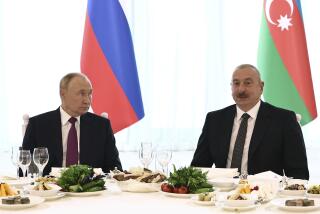Yeltsin Goes to Caucasus to Aid Peace : Diplomacy: Russian leader, hoping to broker truce between Armenians and Azerbaijanis, is accused of grandstanding.
- Share via
MOSCOW — Russian Federation President Boris N. Yeltsin embarked Friday on a peace mission to the Caucasus Mountains, leaving behind a trail of accusations that he was grandstanding for international prestige while ducking criticism for troubles in his own republic.
Yeltsin suffered what has been described as a mild heart attack Wednesday and did not take part in the first two days of a crucial Russian Supreme Soviet session that will work out details of the republic’s transition from central planning to a market economy.
In his absence on the opening day Thursday, rival deputies lambasted his recent decrees transferring many government and parliamentary functions to the control of the presidency. On Friday, the Supreme Soviet voted overwhelmingly to deem the Russian leadership’s handling of economic affairs “unsatisfactory.”
Grain output this year is expected to be down significantly from 1990 to about 170 million tons, which will force Russia to devote scarce resources to importing food. Hard-currency earnings have plummeted this year because of a 51% fall in oil exports, forced by declining production and decrepit transportation and storage facilities.
Yeltsin’s decision to go ahead with a trip aimed at brokering a truce between battling Armenians and Azerbaijanis triggered complaints by some deputies that he had been feigning ill health as an excuse to avoid their criticism.
After issuing their decree of “unsatisfactory” performance by the Russian government, the deputies passed a resolution suggesting that Yeltsin reconsider his Cabinet appointments “with a view to removing from office those leaders who do not ensure the enactment of the laws and resolutions” passed by legislative bodies.
Many of the legislators accuse Yeltsin of running roughshod over the republic constitution’s balance of powers. The president last week announced that he was subordinating all government functions to his executive office. He also issued a sheaf of decrees giving the presidency the power to hire and fire virtually all regional and local officials in the vast republic.
During a raucous debate on Russia’s economic woes, several deputies shouted out accusations that Yeltsin was putting his political image ahead of domestic concerns.
Yeltsin, who had not been seen in public since the reports of his heart trouble, was shown on Russian television news late Friday as he prepared to leave for the Azerbaijani capital of Baku. He appeared in relatively good health and told an interviewer that he considered it necessary to work for a settlement of the Caucasus ethnic conflict because the lives of Russian troops were also at stake. Some Soviet army units have been sent in to impose order.
Yeltsin and Kazakhstan President Nursultan A. Nazarbayev were asked a month ago to act as mediators in a four-year-old battle between Armenia and Azerbaijan over Nagorno-Karabakh. That mountainous enclave is predominantly populated by Christian Armenians but was deeded to Azerbaijan nearly 70 years ago.
Hundreds have been killed in battles sparked by Armenian claims that they are repressed by the Muslim Azerbaijanis and demands for repatriation with the Armenian republic.
Yeltsin is expected to unveil the details of a proposed truce worked out with the help of Soviet President Mikhail S. Gorbachev. The peace plan reportedly outlines certain security guarantees for both sides, allowing negotiations over Nagorno-Karabakh to begin.
Yeltsin and Nazarbayev planned to visit the Nagorno-Karabakh regional center of Stepanakert today, then travel to the Armenian capital, Yerevan, for talks with republic leaders there.
While traveling in the volatile region where hundreds have been killed in the sporadic conflict, the two presidents will be guarded by a special contingent of veterans of the Afghan war.
Nagorno-Karabakh Dispute
History: The Soviet republics of Armenia and Azerbaijan have disputed the status of Nagorno-Karabakh since the Kremlin gave control of the region to Azerbaijan in 1923. Each people claims historical and cultural ties to the land. About 75% of the region’s population is Armenian, predominantly Christians, while Azerbaijanis are mainly Turkish Muslims.
Clashes: In February, 1988, the conflict escalated. To avoid further fighting after the Armenian earthquake, Soviet troops were sent to the region in January, 1989. But skirmishes continue and more than 800 people have been killed.
Politics: Azerbaijan acquired direct control of the disputed territory when Moscow ended its direct rule in November, 1989. The decision by the Supreme Soviet brought Armenia and Azerbaijan to the brink of civil war.
More to Read
Sign up for Essential California
The most important California stories and recommendations in your inbox every morning.
You may occasionally receive promotional content from the Los Angeles Times.














